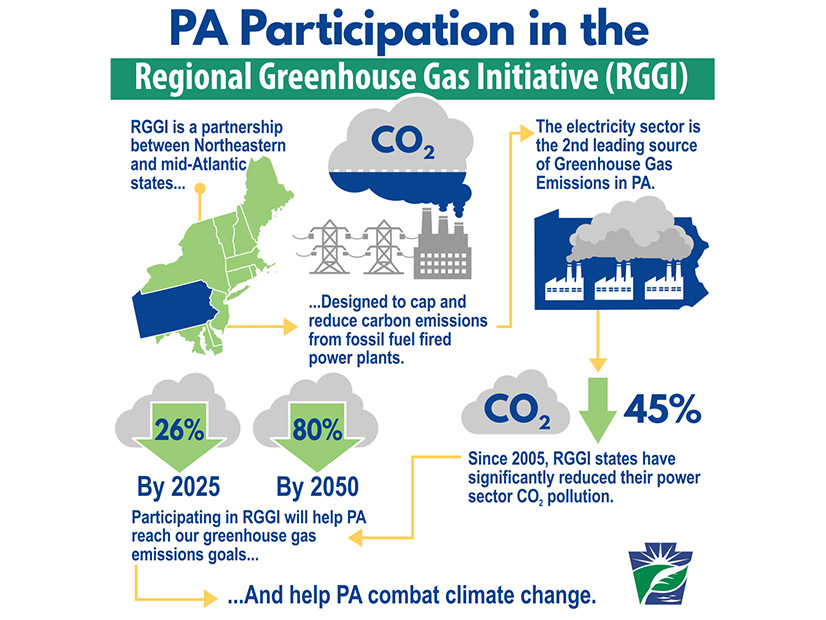The Pennsylvania Department of Environmental Protection last week published its long-awaited rulemaking requiring fossil fuel generators in the state to obtain emission allowances under the Regional Greenhouse Gas Initiative (RGGI).
Gov. Tom Wolf (D) has been battling with the Republican majority legislature since he signed an executive order in 2019 directing DEP to draft the rulemaking for joining the compact. In September, the General Assembly passed a bill barring the state from joining RGGI or taking any action to control carbon dioxide emissions without legislative approval, but Wolf vetoed it.
RGGI opponents contend the Pennsylvania Air Pollution Control Act requires the DEP to submit regional air pollution programs to the legislature and that the rule constitutes a “tax,” which requires legislation.
The Wolf administration counters that because auction proceeds would be used for initiatives to reduce CO2 emissions, they would be considered administrative costs of implementing the state’s air pollution control program.
The administration hopes to complete the rulemaking by the end of the year. The state Environmental Quality Board, which must approve DEP regulations, is scheduled to consider the final draft in the third quarter. It voted 13-6 to support the initial draft proposal last September.
The proposal will be discussed by DEP advisory committees in meetings this month, including the Air Quality Technical Advisory Committee on May 17 and the Small Business Compliance Advisory Committee and Citizens Advisory Council on May 19.
Assuming the state joins RGGI by January 1, 2022, the rule would set an initial base budget of 78 million tons per year (MM tCO2/Y), with the cap reduced by 2.49 MM tCO2/Y through 2030, when it would reach 58 MM tCO2. Pennsylvania’s power sector emitted 76.7 MM tCO2 in 2017, according to DEP, 29% of the state’s total emissions.
The rulemaking does not spell out in detail how the state would distribute auction revenues, saying only that they will be used to eliminate air pollution. DEP said in December it expects up to $320 million annually and that some of the spending would go to energy efficiency and renewable energy development. (See Pa. Eyes EE, Renewables for RGGI Funding.)
Threat to Exports?
A DEP modeling report predicted that joining RGGI and investing allowance revenues in energy efficiency, renewable energy, electric vehicles and research and development would increase solar, hydro, and wind generation while coal generation would drop because of low gas prices and increased renewables.
Coal represented 17% of the state’s net generation in 2019, down from 48% in 2010. Over the same period, natural gas tripled its share to 43%, exceeding nuclear power’s share for the first time in 2019. Pennsylvania ranked second to Illinois in electric generation from nuclear power in 2019, according to the Energy Information Administration..
Pennsylvania is the third-largest producer of electricity in the nation, behind only Texas and Florida, and the state exports more power than any other state, according to EIA.
DEP’s modeling indicates exports could decline by about 8% with a 19% reduction in exports to RGGI states within PJM partially offset by a big increase in exports to non-RGGI PJM states. Exports to NYISO were projected to drop by 27%.
DEP predicts joining RGGI will increase Gross State Product by almost $2 billion and jobs by more than 27,000 between 2022 and 2030.





